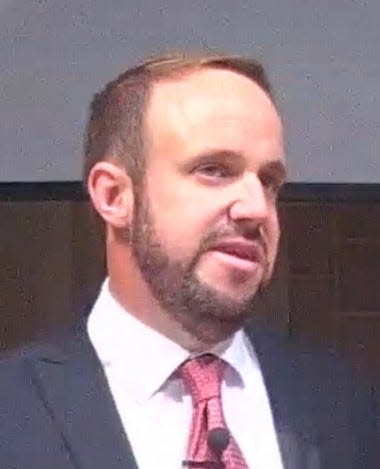My Turn: Jesus remains the Lion of Judah, and the Lamb who was slain for our sins
- Oops!Something went wrong.Please try again later.

On Friday, October 6, The Star ran a piece by Chris Highland with the title, “Saying goodbye to the Jesus I once knew.” As a working pastor in the city covered by the newspaper to which Mr. Highland submitted his article, I am writing to respond.
The article seems to be his analysis, followed by a rejection, of the current landscape of Christian worship and belief. His analysis is based upon his viewing of two worship services, from two unnamed churches, online and simultaneously, in split-screen format.
It should be obvious to even a casual observer that a single virtual viewing is hardly a solid basis for a fair evaluation. Yet this does not stop Mr. Highland from extrapolating from these two worship services a spectrum of current Christian belief and presenting it as universal truth. Perhaps this is why his article contains so many mischaracterizations.
For example, I know of no evangelical Christian tradition that presents the Christian faith as a “spiritual spin cycle,” to borrow his phrase — an anxious back-and-forth between guilt, confession, and relief. The same could be said concerning his assertion that churches today present the solution to the emptiness of the human heart as “to say a particular prayer, participate in a regular ritual, or come to a specific church.” Unfortunately, this appears to be Mr. Highland’s own interpretation of the Christian gospel, since neither the rote reciting of a prayer nor attending a particular church have ever been the solution to human brokenness and sin advocated by evangelical Christianity.
Just as unfairly, he sums up the message of the Christian church as a deceitful contradiction, as though preachers are intentionally speaking out of both sides of their mouth. He writes that in these churches, “‘He loves you unconditionally’ comes with a footnote: ‘But don’t hurt or disappoint him.’” Anyone who has raised children will understand that the two statements are hardly at odds with one another. My mother loves me unconditionally as her son, and I do not want to hurt her. This is indeed the message of the Christian gospel — that God loves unconditionally those who trust in His Son, and we want to please him — not despite His love, but because of it.
More could be said, whether concerning his caricature of the Christian God as an egomaniacal deity “in serious need of praise,” or his absurd assertion that Jesus of Nazareth would somehow agree with the agnostic humanist Robert G. Ingersoll who opined that personal happiness is the highest good a human being can pursue.
But more seriously, Mr. Highland unknowingly commits a well-known error in the discipline of Christian thought. Over the last three centuries, a series of quests were undertaken to find the “historical Jesu," the idea being that the four gospels of the New Testament are a mix of accuracies and inaccuracies, and that the real “historical Jesus” lay somewhere between the lines. Soon, the results became clear: the “historical Jesus,” supposedly unearthed objectively by each historian from between the lines of the gospels of Matthew, Mark, Luke, and John, looked not like a historical figure, but like the individual historians themselves.
And this gets to the primary problem. Mr. Highland wants to find the “real” Jesus. But the real Jesus is to be found in the earliest and most reliable historical documents that exist: the four gospels that are included in our copies of the New Testament. When we search for him any other place, we run the risk of making Jesus in our own image, and the “real” Jesus we believe we’ve found simply looks a lot like us. A Jesus that is just a baptized version of me will only affirm me, celebrate me, and agree with me. If he is just like me, he cannot save me or love me or challenge me. In the words of the late Tim Keller, “Only if your God can say things that upset you will you know you have a real God and not just a creation of your imagination.”
There are points of agreement I share with Mr. Highland, such as concerns about emotional manipulation in churches, an overly-individualized faith, preaching to entertain rather than build up, and worship services that look more like sold-out concerts than anything resembling church.
However, despite styling himself as a “freethinker,” Mr. Highland comes across as condescending toward the actual Christians who have read his article. Even more tragically, Mr. Highland’s search for the “real” Jesus only ensures that he will continue to be unable to find him.
Jesus is not found only in church — this is true. But in every church that remains faithful to the sacred texts of the Bible, he is in their midst. Jesus shows us that God is neither an egomaniacal deity nor the accepting hippie of Mr. Highland’s imagination. For evangelical Christians, he is the Lion of Judah, and the Lamb who was slain for our sins — the perfect embodiment of grace and truth.
Dustin Mace is the senior pastor at Buffalo Baptist Church of Shelby.
This article originally appeared on The Gaston Gazette: My Turn: Jesus remains the Lion of Judah, the Lamb slain for our sins
